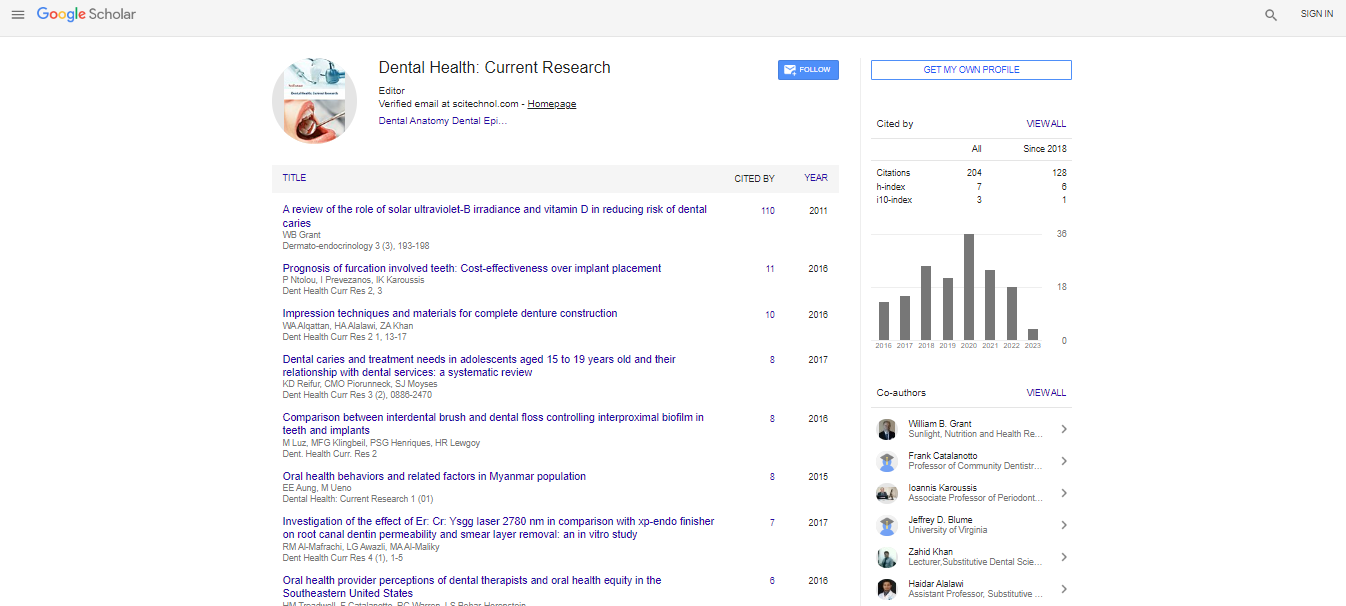Perspective, Dent Health Curr Res Vol: 10 Issue: 1
Comprehensive Guide to Dental Caries: Prevention Strategies and Modern Treatment Approaches
Maurio Gonsalvez*
1Department of Oral and Maxillofacial Surgery, University Medical Center Rotterdam, Rotterdam, The Netherlands
*Corresponding Author: Maurio Gonsalvez,
Department of Oral and Maxillofacial
Surgery, University Medical Center Rotterdam, Rotterdam, The Netherlands
E-mail: m.gonsalvez123@yahoo.com
Received date: 22 July, 2024, Manuscript No. DHCR- 24-147386;
Editor assigned date: 24 July, 2024, PreQC No. DHCR- 24-147386 (PQ);
Reviewed date: 07 August, 2024, QC No. DHCR- 24-147386;
Revised date: 14 August, 2024, Manuscript No. DHCR- 24-147386 (R);
Published date: 21 August, 2024, DOI: 10.4172/2470-0886.1000227
Citation: Gonsalvez M (2024) Comprehensive Guide to Dental Caries: Prevention Strategies and Modern Treatment Approaches. Dent Health Curr Res 10:4.
Description
Dental caries, commonly known as tooth decay or cavities, is one of the most prevalent oral health problems worldwide. It affects individuals of all ages, from young children to the elderly and, if left untreated, can lead to pain, infection and tooth loss. Dental caries is caused by the interaction between bacteria in the mouth, sugars from food and drinks and the tooth surface. It explores the causes of dental caries, methods of prevention and current treatment options available to manage this widespread condition.
The primary cause of dental caries is the activity of specific bacteria in the mouth, particularly Streptococcus mutans and Lactobacillus species. These bacteria feed on sugars and carbohydrates that are left on the teeth after eating. As they metabolize these sugars, they produce acids as byproducts. These acids can demineralize the enamel, the hard outer surface of the tooth, leading to the formation of cavities. If not addressed, the decay can progress deeper into the tooth, affecting the dentin and eventually the pulp, where nerves and blood vessels are located.
A diet high in sugars and fermentable carbohydrates is a significant risk factor for the development of dental caries. Frequent consumption of sugary snacks, soft drinks and other carbohydrate-rich foods provides a constant food source for the bacteria in the mouth, leading to more acid production and a higher risk of tooth decay. Sticky foods, such as candies and dried fruits, are particularly problematic because they tend to adhere to the teeth, prolonging the exposure of the enamel to acids. Inadequate oral hygiene practices, such as irregular brushing and flossing, allow plaque, a sticky film of bacteria, to accumulate on the teeth. Plaque that is not removed can harden into tartar, which further protects bacteria from being washed away by saliva or brushing. Regular removal of plaque through brushing and flossing is essential to prevent the buildup of bacteria and acids that cause tooth decay.
Fluoride is one of the most effective agents in preventing dental caries. It works by strengthening the enamel, making it more resistant to acid attacks from bacteria. Fluoride can be obtained from various sources, including fluoridated drinking water, toothpaste, mouth rinses and professional fluoride treatments provided by dentists. Regular use of fluoride toothpaste is recommended as part of daily oral hygiene to help prevent cavities. Maintaining good oral hygiene is fundamental to preventing dental caries. Brushing twice a day with fluoride toothpaste and flossing daily can remove plaque and food particles from the teeth, reducing the risk of cavities. Using an antimicrobial mouthwash can also help control the growth of bacteria in the mouth. Additionally, for individuals at high risk of caries, such as those with dry mouth or a history of frequent cavities, dentists may recommend additional preventive measures, such as prescription fluoride treatments or custom-made mouth guards that deliver fluoride.
Once dental caries has developed, restorative procedures are necessary to repair the damaged tooth. The most common treatment for cavities is the placement of a dental filling. The decayed portion of the tooth is removed and the cavity is filled with a material such as composite resin, amalgam, or glass ionomer. In cases where the decay has reached the pulp, a root canal treatment may be required to remove the infected tissue and save the tooth. If the tooth is severely damaged, a crown may be placed over it to restore its function and appearance. Recent advances in dental technology have led to the development of minimally invasive techniques for treating dental caries. One such approach is the use of Silver Diamine Fluoride (SDF), a topical solution that can arrest the progression of cavities without the need for drilling. SDF is particularly useful for treating cavities in children or adults with special needs, as it is quick, painless and can be applied in a non-invasive manner.
Conclusion
Dental caries remains a significant public health issue, affecting millions of people worldwide. Understanding the causes of tooth decay, including the role of bacteria, diet and oral hygiene, is essential in preventing its occurrence. By adopting preventive measures such as fluoride use, dietary modifications and regular dental check-ups, individuals can significantly reduce their risk of developing cavities. When decay does occur, modern restorative techniques provide effective treatments that can restore the tooth's function and appearance while minimizing discomfort and preserving natural tooth structure. Through continued education and advancements in dental care, the burden of dental caries can be significantly reduced, leading to better oral health outcomes for all.
 Spanish
Spanish  Chinese
Chinese  Russian
Russian  German
German  French
French  Japanese
Japanese  Portuguese
Portuguese  Hindi
Hindi 